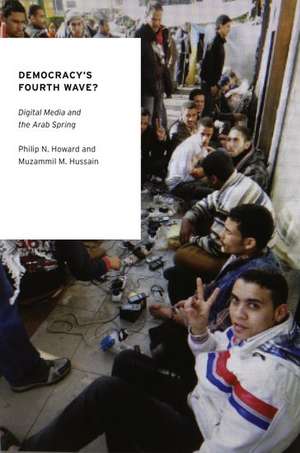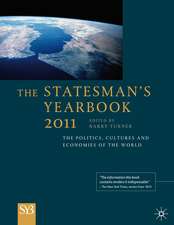Democracy's Fourth Wave?: Digital Media and the Arab Spring: Oxford Studies in Digital Politics
Autor Philip N. Howard, Muzammil M. Hussainen Limba Engleză Hardback – 4 apr 2013
| Toate formatele și edițiile | Preț | Express |
|---|---|---|
| Paperback (1) | 252.57 lei 31-37 zile | +43.58 lei 7-13 zile |
| Oxford University Press – 4 apr 2013 | 252.57 lei 31-37 zile | +43.58 lei 7-13 zile |
| Hardback (1) | 874.14 lei 31-37 zile | |
| Oxford University Press – 4 apr 2013 | 874.14 lei 31-37 zile |
Din seria Oxford Studies in Digital Politics
- 8%
 Preț: 172.74 lei
Preț: 172.74 lei - 18%
 Preț: 172.74 lei
Preț: 172.74 lei - 11%
 Preț: 124.04 lei
Preț: 124.04 lei - 8%
 Preț: 155.19 lei
Preț: 155.19 lei - 14%
 Preț: 186.82 lei
Preț: 186.82 lei - 13%
 Preț: 127.32 lei
Preț: 127.32 lei -
 Preț: 320.09 lei
Preț: 320.09 lei - 14%
 Preț: 190.59 lei
Preț: 190.59 lei - 14%
 Preț: 132.79 lei
Preț: 132.79 lei - 13%
 Preț: 140.87 lei
Preț: 140.87 lei - 14%
 Preț: 125.88 lei
Preț: 125.88 lei - 14%
 Preț: 260.44 lei
Preț: 260.44 lei - 12%
 Preț: 129.91 lei
Preț: 129.91 lei - 9%
 Preț: 170.95 lei
Preț: 170.95 lei - 19%
 Preț: 190.50 lei
Preț: 190.50 lei - 13%
 Preț: 239.11 lei
Preț: 239.11 lei - 13%
 Preț: 113.15 lei
Preț: 113.15 lei - 12%
 Preț: 158.31 lei
Preț: 158.31 lei - 22%
 Preț: 180.44 lei
Preț: 180.44 lei -
 Preț: 349.79 lei
Preț: 349.79 lei - 13%
 Preț: 233.79 lei
Preț: 233.79 lei - 28%
 Preț: 490.84 lei
Preț: 490.84 lei - 5%
 Preț: 249.75 lei
Preț: 249.75 lei - 13%
 Preț: 196.29 lei
Preț: 196.29 lei - 14%
 Preț: 253.71 lei
Preț: 253.71 lei - 20%
 Preț: 228.43 lei
Preț: 228.43 lei - 27%
 Preț: 672.25 lei
Preț: 672.25 lei - 30%
 Preț: 641.98 lei
Preț: 641.98 lei - 27%
 Preț: 198.68 lei
Preț: 198.68 lei - 9%
 Preț: 171.85 lei
Preț: 171.85 lei - 25%
 Preț: 587.66 lei
Preț: 587.66 lei - 5%
 Preț: 267.42 lei
Preț: 267.42 lei - 26%
 Preț: 687.34 lei
Preț: 687.34 lei - 23%
 Preț: 196.96 lei
Preț: 196.96 lei - 19%
 Preț: 190.50 lei
Preț: 190.50 lei - 23%
 Preț: 199.10 lei
Preț: 199.10 lei
Preț: 874.14 lei
Preț vechi: 1175.39 lei
-26% Nou
Puncte Express: 1311
Preț estimativ în valută:
167.26€ • 175.11$ • 138.40£
167.26€ • 175.11$ • 138.40£
Carte tipărită la comandă
Livrare economică 25-31 martie
Preluare comenzi: 021 569.72.76
Specificații
ISBN-13: 9780199936953
ISBN-10: 0199936951
Pagini: 162
Ilustrații: 8 tables, 2 photographs, 5 graphs
Dimensiuni: 236 x 160 x 13 mm
Greutate: 0.41 kg
Editura: Oxford University Press
Colecția OUP USA
Seria Oxford Studies in Digital Politics
Locul publicării:New York, United States
ISBN-10: 0199936951
Pagini: 162
Ilustrații: 8 tables, 2 photographs, 5 graphs
Dimensiuni: 236 x 160 x 13 mm
Greutate: 0.41 kg
Editura: Oxford University Press
Colecția OUP USA
Seria Oxford Studies in Digital Politics
Locul publicării:New York, United States
Recenzii
Democracy's Fourth Wave? guides readers through the avalanche of factors that meshed with digital media to produce the Arab Spring. The authors subtly adapt traditional methodologies to decode mysteries of complex causal effects. In doing so, their book brings clarity and insight to the conundrums of new technologies as factors in regime fragility and protest success.
This unprecedented multidisciplinary approach to the examination of the Arab Spring situates itself in digital revolutions and political transformations. I highly recommend it for students, activists, and policy makers seeking to understand how modern communication technologies are driving the Fourth Wave of Democracy in the Arab world.
This book represents the first serious effort to transcend the polarized debate between cyber-utopians and tech-skeptics regarding digital media's role in the 2011 Arab Uprisings. Carefully argued and documented, it is of landmark importance and should be required reading for all those who seek to understand the interface of technology and political change and the future of democratization.
Philip N. Howard and Muzammil M. Hussain's study implies that... digital media played a much longer term role in creating favorable conditions for uprisings, helped to publicize key igniting events, and then facilitated those uprisings and their diffusion; but digital media did not do this alone or as suddenly as some observers have claimed... There are a number of other unique contributions, but there is insufficient space to review them all. Overall, I predict that future research will look kindly to the authors' key findings, particularly the book's central claim that digital media were one essential ingredient in larger casual recipes for revolution and democratization.
This unprecedented multidisciplinary approach to the examination of the Arab Spring situates itself in digital revolutions and political transformations. I highly recommend it for students, activists, and policy makers seeking to understand how modern communication technologies are driving the Fourth Wave of Democracy in the Arab world.
This book represents the first serious effort to transcend the polarized debate between cyber-utopians and tech-skeptics regarding digital media's role in the 2011 Arab Uprisings. Carefully argued and documented, it is of landmark importance and should be required reading for all those who seek to understand the interface of technology and political change and the future of democratization.
Philip N. Howard and Muzammil M. Hussain's study implies that... digital media played a much longer term role in creating favorable conditions for uprisings, helped to publicize key igniting events, and then facilitated those uprisings and their diffusion; but digital media did not do this alone or as suddenly as some observers have claimed... There are a number of other unique contributions, but there is insufficient space to review them all. Overall, I predict that future research will look kindly to the authors' key findings, particularly the book's central claim that digital media were one essential ingredient in larger casual recipes for revolution and democratization.
Notă biografică
Philip N. Howard is Associate Professor in the Department of Communication at the University of Washington, with adjunct appointments at the Jackson School of International Studies and the Information School. Muzammil M. Hussain is a Ph.D. candidate in Communication at the University of Washington and Visiting Scientist at the Center for Comparative and International Studies, ETH Zurich.













